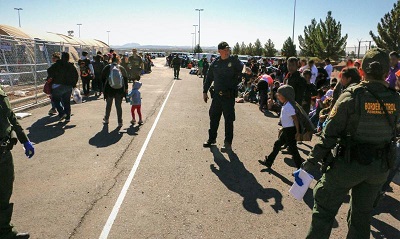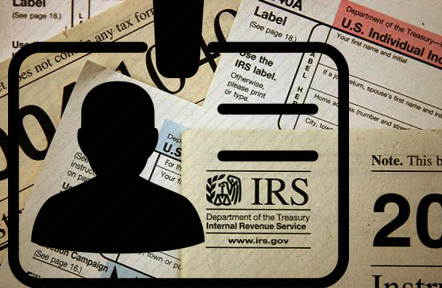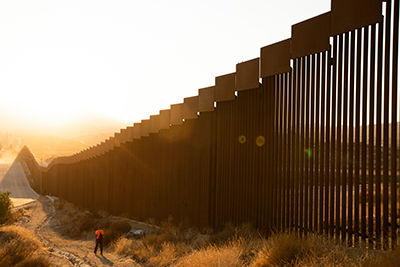Explaining the Border Standoff Between Texas and the Federal Government
 The US Border Patrol had over 6.3 million encounters with illegal immigrant border crossers from the beginning of the Biden administration in January 2021 to December 2023. Almost 4 million of those encounters, or about 58 percent, were in border sectors that are partly in Texas. In addition, the Department of Homeland Security estimates that about 1.6-1.8 million illegal immigrant “gotaways” entered without being apprehended by Border Patrol.
The US Border Patrol had over 6.3 million encounters with illegal immigrant border crossers from the beginning of the Biden administration in January 2021 to December 2023. Almost 4 million of those encounters, or about 58 percent, were in border sectors that are partly in Texas. In addition, the Department of Homeland Security estimates that about 1.6-1.8 million illegal immigrant “gotaways” entered without being apprehended by Border Patrol.
The strength of the US labor market and incredible demand for foreign labor at a time of historically low unemployment and near‐record job openings explains most of the massive surge in encounters over the last several years. Since there are so few ways for lower‐skilled immigrants to enter lawfully and US labor demand is so high, many migrants come illegally.
Many of those coming illegally are allowed into the United States with a notice to appear (NTA) in front of an immigration judge or on parole. In fiscal year 2023, the Border Patrol released 908,788 migrants on parole or with an NTA and transferred an additional 372,018 to other federal agencies like Immigration and Customs Enforcement, Health and Human Services, or the US Marshals. There were 583,051 removals, returns, voluntary returns, and other detentions.
Border Patrol processes large numbers of illegal border crossers who are allowed into the United States, many of whom ask for asylum under US law (the Biden administration is trying to change this), until they get their day in immigration court. The immigration court backlog is currently about 3.3 million, more than ten times more than in 2012. Those migrants are going to be waiting, working, and living in the United States for a long time and many won’t leave even if the court orders them to go.
The escalating number of illegal border crossers prompted Texas Governor Greg Abbott to commence Operation Lone Star, a state‐level initiative to deploy the Texas National Guard, the Texas Department of Public Safety (DPS), and other law enforcement personnel to support border security in March 2021. There were disputes between the Border Patrol and the Texas agencies from the get‐go.
Most contentiously, the Texas National Guard had placed about 70,000 rolls of concertina wire on the border near Eagle Pass by October 2023. Border Patrol was upset about that because it reduced their ability to move along the border, especially to move from the riverbank into the Rio Grande, where many migrants were crossing and some were drowning. The Texas National Guard and DPS occasionally cut the wire to assist migrants in danger or process them for removal or release, but the Border Patrol and Texas disagreed about when to cut it, and Border Patrol sometimes did so without permission.
In September 2023, Border Patrol began to cut the concertina wire placed by the Texas National Guard in Eagle Pass, Texas. On October 24, the State of Texas sued in federal court to make the Border Patrol stop cutting the wire. Three days later, Texas Attorney General Ken Paxton filed an emergency motion for a temporary restraining order to halt Border Patrol from removing concertina wire. The court granted a temporary restraining order on October 30 to halt Border Patrol from further removing concertina wire. The Federal district court ruled against Texas’s request for a temporary injunction pending trial on November 29th. Texas appealed to the United States Court of Appeals for the Fifth Circuit the next day. The court granted an emergency stay on the district court’s order, and the court enjoined Border Patrol on December 19 from further destruction of the concertina wire except in cases of medical emergency. On January 2nd, 2024, US Solicitor General Elizabeth Prelogar filed an Application to Vacate the Injunction Pending Appeal with the Supreme Court.
Until this point, all parties in the case were playing nicely. On January 10, the situation spun wildly out of control when the State of Texas seized Shelby Park, which is owned by the city of Eagle Pass and abuts the Rio Grande. The Texas National Guard then built fencing around the park and denied Border Patrol access to the park’s facilities, including the boat ramp.
A spokesperson for Governor Abbott justified the seizure by arguing that “Texas is holding the line at our southern border with miles of additional razor wire and anti‐climb barriers to deter and repel the record‐high levels of illegal immigration invited by President Biden’s reckless open border policies … the Biden administration allows unfettered access for Mexican cartels to smuggle people into our country.”
Prelogar filed a supplemental memorandum with the Supreme Court on January 12 arguing that the state’s seizure of the park and the construction of fencing prevented Border Patrol from accessing part of the river by denying them access to Shelby Park’s boat ramp, which was to become crucially important. The day before, January 11, Border Patrol stopped operating boats along that section of the river because Texas denied them access to the boat ramp in Shelby Park. On the night of January 12, a Mexican woman and two children drowned in the river by Shelby Park in the area where Border Patrol was patrolling before being denied access to the park.
Prelogar filed a second supplemental memorandum with the Supreme Court on January 15, noting that Mexican authorities informed Border Patrol of the drowning on the night it occurred but after the fact, and that the active Border Patrol supervisor went to the gate at Shelby Park to inform the Texas National Guard that there were migrants in distress in the river. The Texas National Guard denied Border Patrol access to the park. Texas disputed many of those facts a few days later, and some details remain unanswered.
On January 22, the Supreme Court vacated the Fifth Circuit’s ruling that barred Border Patrol from removing wire and granted them access to all areas of the border. The next day, the Department of Homeland Security (DHS) asked for Border Patrol to be allowed access to Shelby Park by January 26. On that day, Texas denied DHS’ request to “once again transform Shelby Park into ‘an unofficial and unlawful port of entry.’” Texas will be arguing its case in front of the Firth Circuit on February 7. Expect another appeal regardless of the ruling.
In response to the Supreme Court allowing Border Patrol to access the border, Governor Greg Abbott made an incredible statement that is worth reading in its entirety. The most important section is this:
James Madison, Alexander Hamilton, and the other visionaries who wrote the US Constitution foresaw that States should not be left to the mercy of a lawless president who does nothing to stop external threats like cartels smuggling millions of illegal immigrants across the border. That is why the Framers included both Article IV, § 4, which promises that the federal government “shall protect each [State] against invasion,” and Article I, § 10, Clause 3, which acknowledges “the States’ sovereign interest in protecting their borders.” Arizona v. United States, 567 U.S. 387, 419 (2012) (Scalia, J., dissenting).
The failure of the Biden Administration to fulfill the duties imposed by Article IV, § 4 has triggered Article I, § 10, Clause 3, which reserves to this State the right of self‐defense. For these reasons, I have already declared an invasion under Article I, § 10, Clause 3 to invoke Texas’s constitutional authority to defend and protect itself. That authority is the supreme law of the land and supersedes any federal statutes to the contrary. The Texas National Guard, the Texas Department of Public Safety, and other Texas personnel are acting on that authority, as well as state law, to secure the Texas border.
Twenty‐five Republican governors issued a joint statement supporting Governor Abbott and his claim that Texas is being invaded by “illegal immigrants, deadly drugs like fentanyl, and terrorists.” Abbott’s statement has many other supporters.
Abbott is claiming that Article I, § 10, Clause 3 of the Constitution—“No State shall, without the Consent of Congress, lay any Duty of Tonnage, keep Troops, or Ships of War in time of Peace, enter into any Agreement or Compact with another State, or with a foreign Power, or engage in War, unless actually invaded, or in such imminent Danger as will not admit of delay”—gives Texas the power to declare that illegal immigrants are invading and that Texas can wage a war against them. Illegal immigration and the chaos that accompanies it are big problems, but the only thing that illegal immigrants coming here to work and the German Army entering Paris in 1940 have in common is that people are moving in both cases.
Ilya Somin and Aaron Reichlin‐Melnik have explained in detail why “actually invaded” means “actually invaded by a foreign military,” according to the Founding Fathers who wrote the Constitution and every court since then. However, I’d just like to highlight a quote from the case of Padavan v. New York where several state senators sued the federal government for compensation for state costs incurred by illegal immigration. They claimed, among other things, that New York was being invaded under the definition of Article I, § 10, Clause 3—just like Abbott. The court dismissed the complaint for failure to state a claim and this robust logic:
Assuming, arguendo, that the plaintiffs’ Invasion Clause claim is justiciable, the claim still must be dismissed for failure to state a claim upon which relief can be granted. In order for a state to be afforded the protections of the Invasion Clause, it must be exposed to armed hostility from another political entity, such as another state or foreign country that is intending to overthrow the State’s government. See The Federalist No. 43 (James Madison) (stating that the reason for the Invasion Clause is to protect the states from “foreign hostility” and from “ambitious or vindictive enterprises” on the part of other states or foreign nations). Clearly, New York State is not being subjected to the sort of hostility contemplated by the Framers.
The Father of the Constitution’s statement on one page of The Federalist Papers should carry more weight with Originalists than all the press releases by all the governors in the United States. After all, Madison was president when Washington, DC was burned in 1814 when the British invaded during the War of 1812—he knew much about what “actually invaded” means.
None of this is to deny that illegal immigration is a serious problem. Bad legal arguments and linguistic confusion do not obscure the disaster of a chaotic border. In my first Cato blog post in 2012, I argued that expanding legal immigration is the only way to reliably and permanently reduce illegal immigration so long as the United States is a desirable destination.
President Biden could reduce illegal immigration by expanding the successful parole program that allows some American‐sponsored Cubans, Venezuelans, Nicaraguans, and Haitians to fly into the United States legally. Governor Greg Abbott should help the Biden administration by dropping Texas’s other lawsuit against parole and refraining from further inhibiting trade for no good reason. Other than crashing the economy, expanding legal immigration is the only reliable way to massively reduce illegal immigration without committing crimes against humanity.
Not every serious problem is an invasion that requires the government to shoot people. I hope that Governor Abbott and President Biden tone down the rhetoric and de‐escalate this situation. In President Biden’s case, it means relying on the courts without federalizing the Texas National Guard. In Governor Abbott’s case, it means reading Federalist No. 43 by James Madison.








